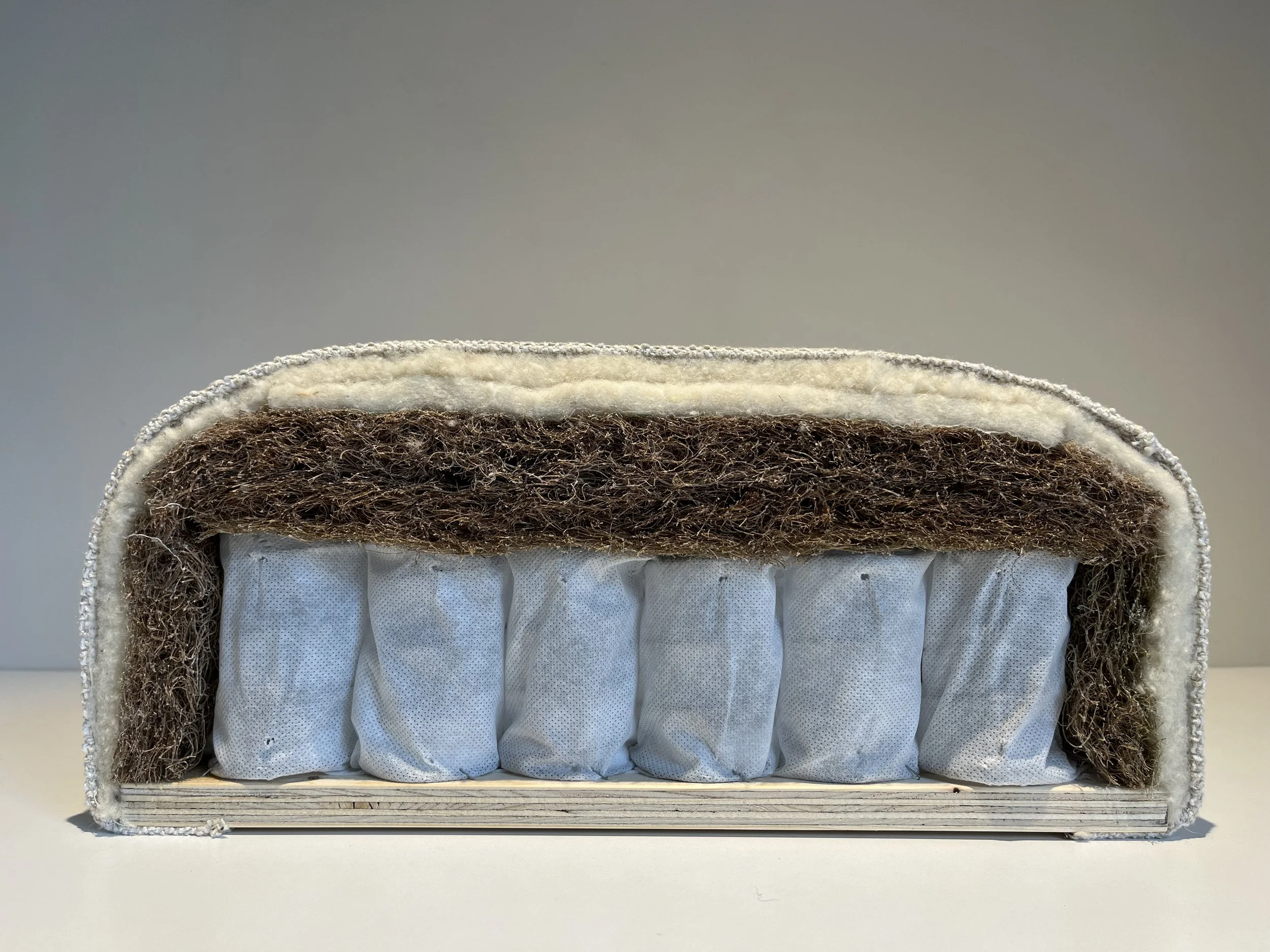Manufacturing Change
For myriad reasons, 2023 has proven to be another tough year. So what better way to round it off and see in a new one than with some much needed positive insight of changes in how materials are being utilised in the manufacturing of products and furniture?
Anyone who kept an eye out for the announcement of the winners of the prestigious Dezeen Awards will have no doubt clocked Pearson Llyod being lauded with the Designer of the Year award. And for those who visited the Material Matters Fair during the London Design Festival that will probably come as no surprise. The studio itself, which was formed back in 1997 in east London by Luke Pearson and Tom Llyod, has long taken a rigorous research-led approach to industrial, product, interior and furniture design. Describing the team as both designers and strategists, they “focus on decoding complexity to create products and experiences that balance the rapidly changing needs of user, client and planet.” The latter took centre stage during the R&D exhibition Material Change, which stood out from an impressive crowd of designers and makers at Material Matters in September.
Rather refreshingly, the team chose to recognise the responsibility they hold in manufacturing mass-produced products and used the event to shine a light on the numerous circular design decisions they have made over the past 15 years. The informative exhibition highlighted that with a circular system in place, material sourcing and recovery share equal thinking time, along with production and distribution, rather than more traditional models that focus almost exclusively on form, function and user experience.
The team utilises invaluable data that allows them to understand “the relative impact of material choices in terms of carbon dioxide equivalence (CO2e) and set benchmarks for their material specifications. Although the reflective nature of the event also helped to pinpoint a series of working principles that further guide the studio’s design decision-making when to comes to materiality. One of those principles is making use of waste materials, which their work on Bene’s bFRIENDS desk accessory range is testament to. As opposed to energy-hungry injection moulded plastic the colourful objects are made from recycled bioplastic (RPLA: 0.96 kg CO2e) derived from food packaging waste using speedy additive manufacturing supplied by recent start-up Batch.Works. The objective of outsourcing the manufacturing in this way is to create an agile and local process that greatly reduces transportation and storage requirements, while also reducing the cost of tooling. However, the circle isn’t closed by shifts in production alone; that requires systematic alterations from start to finish. Cue Batch.Works take-back scheme, which gathers end of life products and recycles them back into the production loop.
The willingness to engage with new technologies is apparent in much of the company’s output, although it is underlined by another recent collaboration with textiles manufacturer Camira. Together they have pushed the boundaries of 3D knitting through a series of experiments that inquisitively explore the possibilities of form, weight and strength, which have culminated in Pupa. The expressive sculptural lighting is made from a rustic frame of compostable wood, onto which 100% post-consumer recycled polyester is wrapped. The composition of the fabric includes 75% SEAQUAL® yarn, which recycles plastic debris floating discarded in our seas. The tensile lighting range is arguably just the start, and the team now has it’s sights set on transforming traditional upholstery techniques and material combinations.
Indeed, they have set about challenging the status quo of using polyurethane foam in upholstered furniture through the application of bio-based materials that replace the thermoset plastic, which is notoriously difficult to recycle and breaks down over time. The Edge Free sofa for Modus consists of layers including, Cocolok (coconut fibre and natural latex), felted wool and pocket springs. These bio-based materials offer a reduction in the industry’s ongoing reliance on fossil-fuel derived materials, which in itself delivers a a significant CO2e saving per product and its impact on global warming.
Being bio-based also opens the consumer to the option of biodegradable disposal at the end of the products life cycle, which is of course less impactful on the planet. Alongside this, the studio has also considered how self assembly of furniture such as the Cross Chair for B Corp TAKT can save on bulky transportation and storage, although they have pushed the hands-on approach even further by introducing the possibility for that once second nature notion: repair. The CoLab range, designed for Senator, is designed with exposed, external fixings that make assembly simple while allowing for parts to be replaced as and when required, rather than discarding the entire item. The products are targeted at university sites, where standard hospitality furniture, often with complex upholstery, have become the norm. In such high traffic environments current products often don’t stand the test of time and create a large volume of waste, not to mention cost. The reversible assembly of the CoLab range instead allows for longevity and customisation, while the hybrid functionality of the furniture itself allows for user interpretation and flexibility.
And thankfully, such considered and innovative approaches to materiality, production, distribution, use and recovery of products isn’t exclusive to Pearson Llyod and the brands they are working with. During Dutch Design Week a group of established company came together to form a new collaboration in the Dutch furniture industry. Future>Factory>Furniture was the combined effort of Arco, CS Rugs, Gelderland, Label van den Berg, Lande Family and Leolux, all of whom also aim to live up to the responsibility of creating a more sustainable built environment. Covering everything from tables to chairs and rugs to sofas, such brands would traditionally be seen as a form of competitor, but for the event they focused on their common goal and let transparency do the talking. The factory element of the exhibition drew attention to the more sustainable production methods each company is employing, furniture broke down the objects and their material ingredients, while future spotlit some of the more innovative material alternatives at play such as biofoam, traceable leather and sustainable wool.
Thinking more intently about how and where materials are generated, as well as the amount of energy required in producing them and the furniture they are applied to is a noble act for individual companies, but to do so collectively has the potential to really move the debate and the necessary actions forward regarding sustainable manufacturing. Opening the door to other brands as well as letting the consumer in to see how their products are made, which Hans Filippini, CCO of Leolux points out is one of the driving factors behind the exhibition:
“This presentation will not be a proud representation of how well we are doing, but rather an open question, in which we identify the challenges that lie ahead and invite everyone to undertake this quest together. And we will continue to report on it in the coming years progress we are making.”
These open and ambitious collaborative approaches, both here in the UK and further afield, are indeed heartening in a rapidly changing world. They certainly feel like a collective step in the right direction, and who knows, perhaps in the near future such methodologies become standard practice rather than innovative to the point of award-winning. Bravo to those involved so far nonetheless.
This article was originally published by Design Insider







